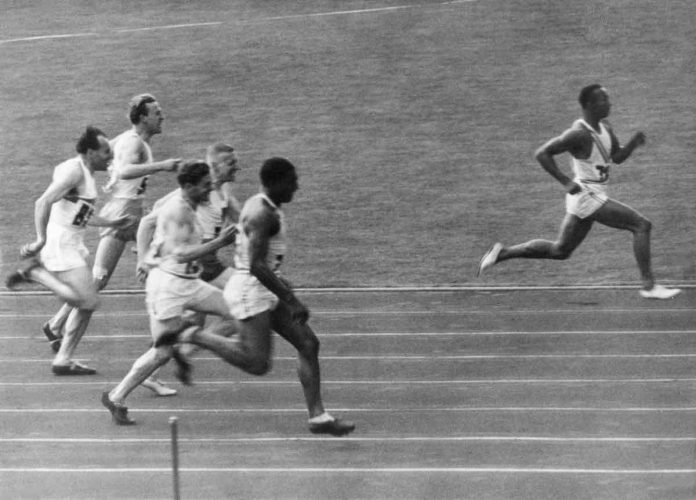At the 1936 Berlin Olympics, African American track star Jesse Owens wins his fourth gold medal of the Games in the 4×100-meter relay. His relay team set a new world record of 39.8 seconds, which held for 20 years. In their strong showing in track-and-field events at the XIth Olympiad, Jesse Owens and other African American athletes struck a propaganda blow against Nazi leader Adolf Hitler, who planned to use the Berlin Games as a showcase of supposed Aryan superiority.
Born the son of Alabama sharecroppers in 1913, Owens emerged as a major track talent while attending high school in Cleveland, Ohio. Later, at Ohio State University, he demonstrated himself to be one of the greatest athletes in the world. In a single day of competition–May 25, 1935–Owens broke the world records for the 220-yard dash, the 220-yard low hurdles, and the running broad jump, and equaled the world record for the 100-yard dash. The next summer, Owens and 311 other American athletes, including 17 African Americans, traveled to Nazi Germany to represent the United States at the XIth Olympiad.
In 1931, the International Olympic Committee awarded the 1936 Summer Olympics to Berlin. The choice was meant to signal Germany’s return to the world community after defeat in World War I. Two years later, however, Adolf Hitler came to power. He transformed the democratic German government into a one-party dictatorship, purged political opponents and suspected dissidents, instituted anti-Semitic policies, and began the remilitarization of Germany.
Hitler initially held the Olympics in low regard because of their internationalism but became an avid supporter after Nazi propaganda minister Joseph Goebbels convinced him of their propaganda value. Seen as an opportunity to advance Nazi ideology, Hitler provided extensive funding for the Berlin Games, which promised to be the largest modern Olympics to date. The Nazi government used sport as part of its drive to strengthen the “Aryan race,” and “Non-Aryans”–Jewish, part-Jewish, or Gypsy athletes–were systematically excluded from Nazi-sponsored sports facilities and associations.
By 1935, a number of athletic groups in the United States were pushing for a boycott of the Berlin Games, but after a heated debate U.S. participation was narrowly approved in December 1935. A number of prominent Jewish athletes in the United States and other countries decided to independently boycott the Games in protest of Nazi oppression of Jews. Spain also planned an alternate “People’s Olympics” to be held in Barcelona in July 1936, but the outbreak of the Spanish Civil War forced its cancellation. In the end, 49 nations sent some 4,000 athletes to the Summer Olympics in Berlin.
Under international pressure, the Nazis agreed to allow one part-Jewish athlete on its Olympic team: fencer Helene Mayer. However, Joseph Goebbels forbid the Nazi-controlled German press from discussing the ethnicity of the blond-haired Mayer.
On August 1, 1936, Adolf Hitler opened the XIth Olympiad. The Olympic ritual of a runner arriving bearing a torch carried by relay from Olympia, Greece, occurred for the first time. The Nazis advertised this ceremony as a symbol of the myth that German civilization was the inheritor of the glorified culture of ancient Greece.













